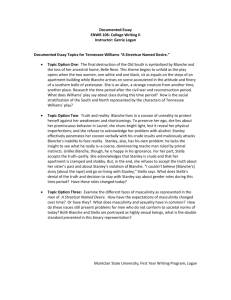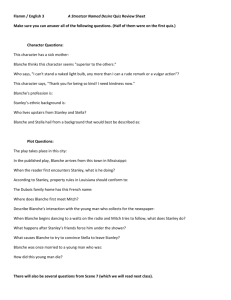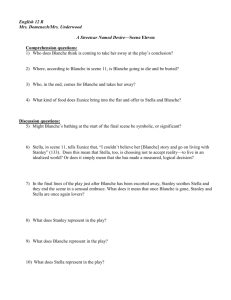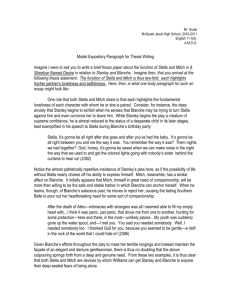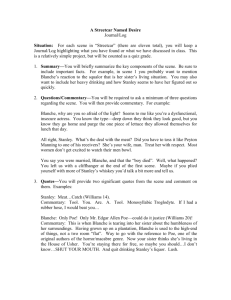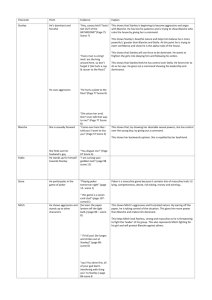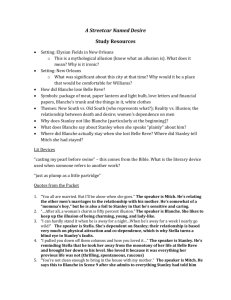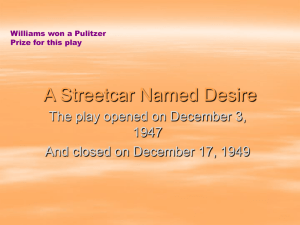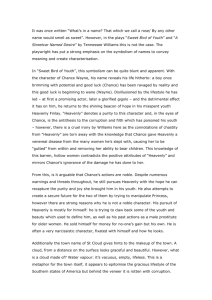StreetcarWorkbook.doc
advertisement
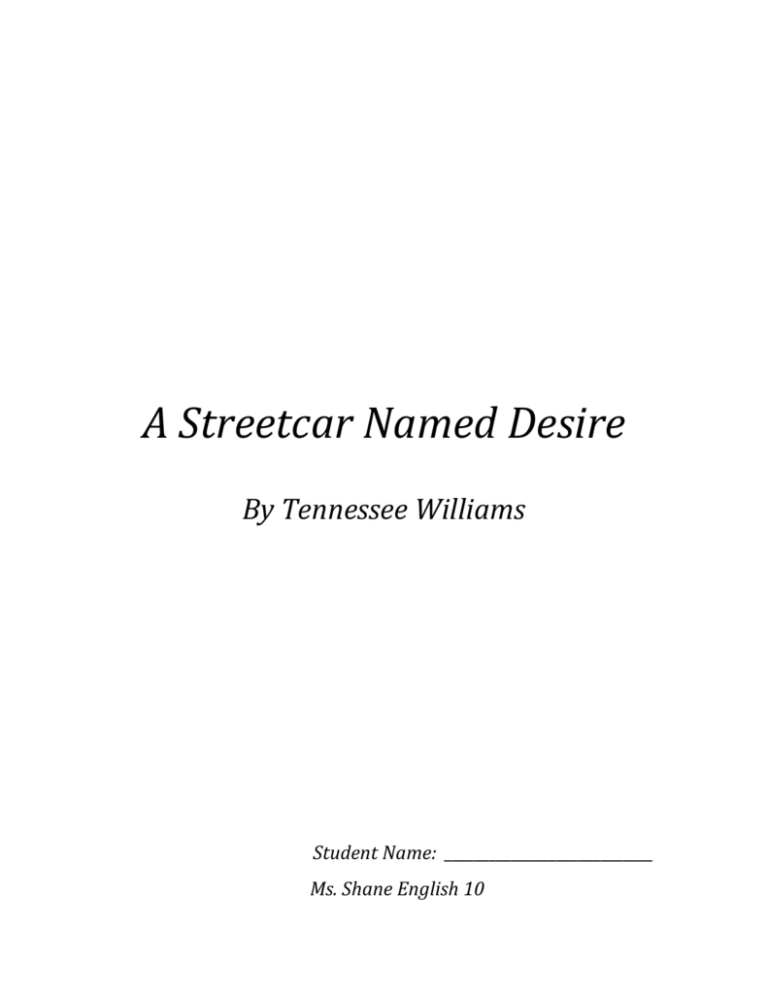
A Streetcar Named Desire By Tennessee Williams Student Name: ____________________________ Ms. Shane English 10 Setting: New Orleans, street - Elysian Fields, 1947. A poorer section of the city. Characters: Directions: As we read thru the play, please complete a full character description (this can be done in point form) for each character in the space provided below. I have given you ONE example for each character. Also, include one quote that shows each of the following: the character’s personality, the character’s wants/desires/ambitions, relationships with other characters, and character’s appearance. You should thus have four quotes total with page numbers. Blanche DuBois: She is about 30. Stanley Kowalski: A factory worker, aged 28 - 30. Stella Kowalski: Stella is the connecting figure to two different worlds - the supposed royalty world of Blanche DuBois and the more common world of Stanley Kowalski. Stella is five years younger than Blanche, about 25. Harold Mitchell (Mitch): A friend of Stanley's from the plant. The two are about the same age. Directions: You decide which character in the play fits the following role: Protagonist--Major character at the center of the story. _______________________________________ Antagonist--A character or force that opposes the protagonist. ________________________________________ Minor character--0ften provides support and illuminates the protagonist. ______________________________________ Static character--A character who remains the same. ___________________________________ Dynamic character--A character who changes in some important way. ___________________________________ Characterization--The means by which writers reveal character. __________________________________ Explicit Judgment--Narrator gives facts and interpretive comment. _________________________________ Implied Judgment--Narrator gives description; reader makes the judgment. _________________________________ Look for: Connections, links, and clues between and about characters. Ask yourself what the function and significance of each character is. Make this determination based upon the character's history, what the reader is told (and not told), and what other characters say about themselves and others. Conflicts: Blanche's delusion vs. Reality Blanche's delusion vs. Mitch Blanche's need to believe that she is superior vs. Stanley's need to feel powerful Stella's love for Blanche vs. Stella's dependency on Stanley Themes: Directions: As we read the play, write down how the following themes present themselves. Please write down a minimum of two examples. - Dependence - Money - Moving On - Death. - Making the best of what you've got. - Superiority - Desperation - Pretense Definitions tragedy – Tragedies evoke the disillusionment and agony of life. Tragic protagonists are destroyed by their own self-destructive tendencies, or by external forces over which they have no control – nature, rivals, society, war, poverty, illness. Their downfall and death often seem predestined. comedy – Comedies reflect the foibles, contradictions, and confusions of man and society. They may be broadly funny and playful, wry and cynical, or satirical and biting. Comic protagonists face many conflicts, but they usually emerge unscathed from them. flat - apartment portiere – a curtain hanging across a doorway neurasthenic – an emotional and psychic disorder that is characterized especially by easy fatigability and often by lack of motivation, feelings of inadequacy, and psychosomatic symptoms contrapuntally – a. a complementing or contrasting item b : use of contrast or interplay of elements in a work of art (as a drama) sotto voce – under the breath : in an undertone; also : in a private manner Bohemian – a person (as a writer or an artist) living an unconventional life usually in a colony with others courtesan – a prostitute with a courtly, wealthy, or upper-class clientele blanche - full discretionary power (as in carte blanche) Questions Scenes 1-3 1. When we first meet Blanche DuBois, she has traveled to see her sister Stella. She took streetcars named Desire and Cemeteries to arrive at her sister’s apartment. What might these names represent? 2. Blanche goes into Stella’s apartment to wait for her to come home. What does she do while she is waiting? 3. What does Belle Reve mean? What does it refer to in the play? 4. Why does Blanche say that she has left her teaching job to visit Stella? 5. Why does Blanche say that she lost Belle Reve? 6. At the end of Scene One, what music “rises up, faint in the distance”? 7. Near the end of Scene One, what do we learn about Blanche’s husband? 8. In Scene Two, Stanley finds out about the loss of Belle Reve. What is his reaction? 9. What does Stanley think that Blanche has done with the money he believes she made from selling Belle Reve? 10. What does Stanley tell Blanche about Stella as they are going through her business papers? 11.Where are Stella and Blanche going while the men play poker? 12.When Blanche and Stella return to the apartment, the men are still there playing poker. Which one does Stella introduce to Blanche? What does Blanche say about him? 13. Blanche goes to the back room, a bedroom, to relax until the men finish playing. She turns on the radio. Stanley asks her to turn it off, but when she doesn’t, what does Stanley do? 14. Why does Blanche lie to Mitch about being younger than Stella? Why doesn’t she like bright lights? 15. What happens between Stella and Stanley that ends the poker game? Characters What kind of relationship do Stella and Stanley have? How does Stanley differ from Blanche? How does Mitch compare and contrast with Stanley? Symbols Music – The play has many stage directions referring to music. What music and songs are present in the first three scenes? How does the music relate to the characters? Light – Why is the paper lantern important to Blanche? Scenes 4-6 16. How did Stella say she reacted to Stanley’s breaking all the light bulbs on their wedding night? 17. What idea does Blanche have to escape New Orleans with Stella? 18. When Blanche and Stella are discussing Stanley, his entrance to the apartment is washed out by a passing train. What does he hear Blanche say about him? 19. In Scene Five, Blanche discusses astrological signs. What sign does she think Stanley was born under and why? What sign does she say she was born under? What does it mean? 20. Seemingly out of the blue, Stanley asks Blanche if she knows someone named Shaw. He says that Shaw knew Blanche from Laurel but must have mixed her up with someone else who partied at the Hotel Flamingo. What is Blanche’s response? 20. Who is coming over to see Blanche on this night? 21. After Stella and Stanley leave, a young man comes to the door collecting money for the local newspaper, The Evening Star. What does Blanche do to him? 22. Blanche and Mitch discuss Stanley. She asks him if Stanley talks much about her and explains how horrid he is making her life there with them. What does Mitch respond? 23. At the end of Scene Six, Blanche is confiding in Mitch by telling him the story of how her husband died. How did he die? What led to that? Characters Blanche – In Scene Five, Blanche is writing a letter to Shep Huntleight. Why does she not tell him the truth of her situation? Blanche- In Scene Five, we see Blanche drinking again. Why do you think she drinks? (Don’t say she’s an alcoholic.) Blanche – Why does Blanche flirt with the newspaper boy? Symbols Music – Where and what kind of music is mentioned in these scenes? Scenes 7-11 24. It is now mid-September and Blanche’s birthday. Stella has prepared a party for her. Stanley lets Stella know that he has learned some things about Blanche. What things? 25. During their talk, Blanche is in the tub and singing. What does she sing about? 26. Who is supposed to come over for Blanche’s birthday? Why does Stanley say this person won’t be coming? 27. What has Stanley bought for Blanche? 28. Blanche is stood up. They sit talking at the table and Stanley gets angry at Stella for telling him his face and fingers are disgustingly greasy. What does he do in response? 29. What happens at the end of Scene Eight? 30. In Scene Nine, who stops by unexpectedly to see Blanche? 31. Blanche makes a very telling statement at the bottom of p. 678 about reality. What does she say? 32. What does Blanche admit happened after her husband’s death? Why did she say she did this? 33. Why does Mitch say he won’t marry Blanche now? 34. Stanley comes home from the hospital. Blanche has been drinking fairly steadily since Mitch left. Who does she tell Stanley she heard from? What invitation does she say he extended? 35. Blanche tells Stanley that Mitch came to see her that night. What does she tell him the reason was? 36. What happens at the end of Scene Ten? 37. Several weeks have passed and Stella is packing Blanche’s things. Where does Blanche think she is going? Where is she actually going? Characters Blanche – Why does Stanley want her to leave? How is her presence affecting his marriage? Stanley – How has his relationship with Stella changed? How has his relationship with Blanche changed? Symbols What do you think is the symbolic meaning of the Mexican woman selling flowers for the dead in Scene Nine? Why does Mitch rip the paper lantern off of the light bulb? What does light represent? Final Questions 1. What character do you have the most sympathy for? Why? 2. Only Scene Three is given a title by Williams. Give a title to three other scenes and explain your reasoning for each title. 3. Why will a woman stay with a man who abuses her? 4. Why are women attracted to “bad boys”? 5. At the beginning of the play, Stanley is bowling and at the end he is playing cards. What does this suggest about his views of life? 6. Is your first loyalty to be with your spouse or with your best friend? Why? 7. Did Mitch love Blanche? 8. If a friend of yours is happily dating someone and you find out something bad about that person, should you tell your friend? Character Trait Poster Assignment Directions: Choose one of the four main characters (Stella, Stanley, Blanche, or Mitch). Draw a picture or illustration of your character in the middle of a poster board. You can also cut and paste images from magazines (such as eyes, body, hair etc.) to form the character. Then find and write the following neatly and attractively on the poster: two quotes that show the character’s personality(and page #’s) two quotes that show the character’s wants/desires/ambitions (and page #’s) two quotes that show relationships with other characters (and page #’s) two quotes that show the character’s appearance (and page #’s) This project will be graded on the following criteria: Appropriateness & relevancy of quotes in each category /2 points two quotes that show the character’s personality (and page #’s) /2 points two quotes that show the character’s wants/desires/ambitions (and page #’s) /2 points two quotes that show relationships with other characters (and page #’s) /2 points two quotes that show the character’s appearance (and page #’s) Creativity & uniqueness of Character image /2 points –Time & effort have been put into this character image /2 points – Character image reflects a thoughtful and reflective approach to your selected character Presentation of your Character Trait poster /3 points- enthusiastic and insightful presentation of your Character TOTAL: /15 points WORKBOOK TOTAL: COMMENTS: /50 points
